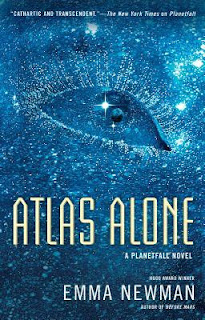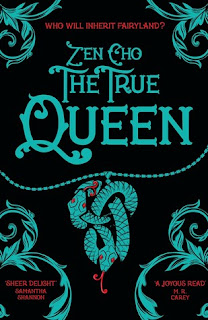4/5 stars on Goodreads
 |
| Atlas Alone by Emma Newman |
Atlas Alone is the fourth book in Emma Newman’s brilliant Planetfall sci-fi series. So far, each book has been a stand-alone, set in different places with different protagonists. But Atlas Alone leans heavily on the second book, After Atlas, with its world-building and characters.
After Atlas introduced a near-future earth where democracy
doesn’t exist anymore and everything is owned by corporations, land, air, and
people included. Some people are indentured to corporations, sold for their
skills or to human experiments. Everyone is chipped with a personal AI that is
both a blessing and a curse. The book ended with the protagonist, Carlos Moreno,
an indentured detective conditioned to never leave a puzzle unsolved, securing a place for
him and his friend Dee on Atlas 2, a space-ship leaving the earth to a distant
planet introduced in the first book, Planetfall. As they leave, they witness
something that has a direct impact to this fourth book.
 |
| Planetfall by Emma Newman |
In Atlas Alone, the point of view protagonist is Dee. She came across as a sulky teenager in After Atlas, but she turned out to be in her early forties. That doesn’t mean much, as people can genetically modify themselves and live for at least a couple of hundred years. Which is good, considering that the journey Atlas 2 is on will take twenty years. Dee is a data analyst who has spent her adult life as a debt slave conditioned in what is called hot-houses to toe the corporate line of whichever business owns her. Her life hasn’t been easy, and she has serious trust and emotional issues.
The book starts six months after the end of After Atlas. Dee
and Carl have trouble adjusting to the life on Atlas 2, mostly because of what
they witnessed as they left the earth. A chance job offer allows Dee to begin a
serious investigation to what happened, who is in charge of Atlas 2 and what is
its mission. This she does by becoming a member of an elite gaming community,
with the help of a mysterious benefactor that has the ability to override her
AI chip. The games turn out to be oddly personal for Dee, as they all have to
do with her past and the tragedies that have shaped her. But she is strong and
unemotional, and has had decades of practice in locking her past away. The
games don’t change who she is, even when her mysterious benefactor tries to
probe into her issues with her past—or especially because of it.
What Dee learns in the games is that the ship is run by
fundamentalist Christians who are prepared to kill millions of people and
enslave the rest. She becomes convinced that the only way to bring them to
justice is to kill them. First she does this within the immersive games, but
somehow the deaths happen in real life too. And then it’s time for her to ditch
the games and kill the rest of the bad guys in real life.
Planetfall books are brilliantly composed to look like
sci-fi mysteries, but each book is actually a journey to the mind and psychopathology
of the protagonist. Each time, it’s done so subtly that the reader is convinced
to the end that the story will turn out to be fairly conventional. In Atlas
Alone, even as the last chapter began, I thought I knew how everything would
turn out. I was wrong.
It’s impossible to talk about the stunt the author pulls at
the very end without spoiling everything. It might seem like a wrong way to
finish the book, but it actually makes the reader re-evaluate the entire story
and realise what it’s been about all along. I found it a perfect and just ending
for Dee.
It takes great skill to dupe the reader to such extent and still
make them appreciate the ending. Here it’s done brilliantly. Nonetheless, I
only gave the book four stars. Some of it is for my disappointment that a book
set on a space-ship mostly ignores the ship in favour of immersive games that
take Dee back to earth. Also, the gaming sections were slightly boring and even knowing their worth in hindsight didn’t change that. But I don’t think
the author is done with the series, and I’m absolutely looking forward to
reading anything she sets in her Planetfall world.




